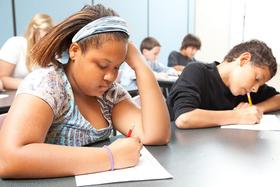Prompting an investigation into an extensive cheating scandal rocked Atlanta schools, public schools in the nation’s capital first came under fire for allegedly cheating on standardized tests. However, a comprehensive investigation into the Washington D.C. cheating issue has revealed that while cheating did occur in some classrooms, the issue was centralized to a small number of classes, rather than hundreds of schools, as previously thought. Still, evidence of any cheating raises questions about the validity of standardized testing and how those scores are used to determine funding, teacher raises and performance evaluations.
Three District of Columbia Schools Cited in Investigation
A report at USA Today states that just three D.C. schools have been found guilty of cheating on standardized tests known as the DC-CAS in April 2011. The reports were limited to three classrooms within these three schools, which represents a very small number of the 5,089 classrooms that actually took the tests. The findings were announced by the Office of the State Superintendent of Education.
“The confirmed cases of impropriety represent a very small percentage of public schools and classrooms in D.C.,” Hosanna Mahaley, superintendent of D.C. schools, told USA Today.
This video reports on cheating on standardized tests in the D.C. public schools.
The three schools were classified as “critical” as a result of the investigation, which meant there was solid evidence found of fraud or test tampering in the test-taking process. The three schools cited were Martin Luther King Jr. Elementary, Langdon Education Campus and Public Charter Perry Street Prep, according to WUSA9. Teachers and test proctors in the classrooms were guilty of cheating; specifically, they gave students answers on the tests and provided students with unauthorized help throughout the testing process.
Parents of the affected students have been notified of the issue, and the test scores have been invalidated. School district officials have stated that the teachers and proctors involved in the cheating would more than likely be fired for their participation in the scandal. Currently, the school system is going through the proper administrative process for dealing with personnel in this type of situation.
“It’s unfortunate that two teachers could not figure out how to ensure their students were successful without going down a dark path,” Kaya Henderson, chancellor of D.C. Public Schools, told WJLA. “Those people will go through our disciplinary process and be terminated.”
Origins of the Investigation
The official investigation was launched into the D.C. school system in response to an investigation by USA Today in March, 2011, according to the Washington Times. USA Today raised questions about the high number of erasures on standardized test forms, which typically switched answers from wrong to right. This clue was also one that helped to initiate the investigation into Atlanta schools, where the cheating problem was found to be more widespread.
Originally, USA began its investigation looking at 103 schools with unusually high rates of erasures between 2008 and 2010. As a result of the USA Today investigation, the D.C. Inspector General’s office and the Department of Education launched their own independent investigation of the problem, using outside firm Alvarez & Marsal.
This video reports on the cheating scandals in Washington, D.C., and Atlanta, Georgia.
The investigation, which has been in process for 15 months to date, pared down the search to 70 classrooms throughout the district. Investigators interviewed 200 teachers and administrators, as well as 80 students, to create an accurate picture of what the test environment looked like at all the D.C. schools in question. While the investigation is still going on, D.C. school officials are taking steps to address the problems that have already been discovered.
School officials, like Henderson, have also been interviewed by the Inspector General’s office. Henderson told the Washington Times that she is unsure how much more time the independent firm will need to complete the investigation. A firewall that has been set up between investigators and school officials has prohibited the transfer of the information regarding the investigation process.
Schools Found with Issues
Originally, the investigation centered on the 70 classrooms within 38 public and charter schools throughout the Washington D.C. school system. During that investigation, the following findings were made:
- 14 schools were completely cleared of any cheating charges
- 11 schools had minor issues
- 9 schools had moderate issues
- 3 schools had critical issues involving test cheating
The other schools on the list that were found to have less serious issues can easily correct the problems through better training of teachers and proctors, the investigation found. Mahaley explained to USA Today that public and charter schools will all be required to use the same standardized test training manuals during the next school year. Teachers will also be assessed to ensure they comprehend the material in the manuals.
This video explains how a (CAS) comprehensive assessment system works.
Standardized Testing Comes into Question – Again
Cheating is just one of the concerns to come to the forefront when discussing standardized testing today. As schools and states put more clout behind scores in terms of school funding and teacher evaluations, the temptation to cheat becomes much greater. As D.C. parent Tomiko Graves told WJLA, “When you put so much stake into a test that determines if a teacher has a job, I can understand what would make a teacher want to do that.”
At this time, Washington D.C. schools appear to have the cheating situation under control. Those caught in the act will be properly disciplined, and new training measures will be instituted to avoid additional issues in the future.
“I am pleased that this investigation is complete and that the vast majority of our schools were cleared of any wrongdoing,” Henderson stated at CBS DC.
Questions? Contact us on Facebook. @publicschoolreview














